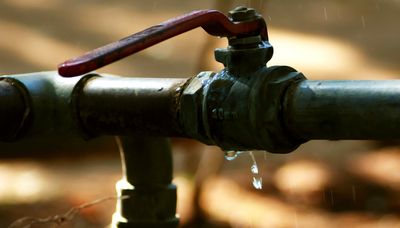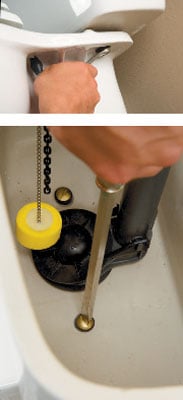5 Regular Water Leak Sources
5 Regular Water Leak Sources
Blog Article
How do you really feel about Where to Find Water Leaks?

"Be cautious of little costs. A little leak will sink a fantastic ship." - Benjamin Franklin.
He couldn't have been more right due to the fact that water leakages in our houses result in a waste of sources, boosting our water expenses. This rise could appear minimal at first, it can lead to substantial expenses that can damage your bank. Apart from a rise in bills, water leaks also create undesirable organic growth, architectural damages, and also electrical dangers.
Figuring out if you have a water leak isn't constantly very easy due to being unable to see the majority of the pipework in your house. If you have had a boost in your water expenses recently, observed water spots on wall surfaces as well as ceilings, smelt lousy odor, and so on. You could intend to take into consideration asking for plumbing services to get it had a look at.
There are several causes of water leakages, and also we have actually assembled the typical factors listed below. Check to see if you have actually had relevant concerns in your house recently.
Blocked drains pipes
Food bits, dust, as well as oil can trigger blocked drains pipes and obstruct the passage of water in and out of your sink. Boosted stress within the gutters can create an overflow and also finish up cracking or rupturing pipelines if undealt with. To stay clear of clogged drains in your house, we suggest you to avoid pouring bits down the tubes as well as routine cleansing of sinks.
High water stress
You saw your home water pressure is higher than typical however then, why should you care? It's out of your control.
It would be best if you cared because your average water pressure should be 60 Psi (per square inch) and although your residence's plumbing system is made to hold up against 80 Psi. A boost in water pressure can place a strain on your residence pipelines and cause fractures, or worse, burst pipes. If you ever before notice that your home water pressure is more than normal, connect with a specialist about controling it.
Rust
As your pipework ages, it gets weak and also a lot more susceptible to rust after the frequent flow of water with them, which can eat away at pipelines as well as cause splits. A visible indication of corrosion in your house plumbing system is discoloration and also although this might be hard to discover as a result of most pipes hidden away. Once they are old to guarantee a sound plumbing system, we suggest doing a frequent checkup every couple of years and also transform pipelines
Deteriorated pipe joints
Pipeline joints are the parts of our plumbing system where the pipes attach. They are the weakest point of our plumbing system. Because of this, they are much more at risk to degeneration. It is necessary to keep in mind that even though pipes are developed to hold up against pressure and last for a while, they weren't developed to last for life; therefore, they would deteriorate over time. This wear and tear could lead to cracks in plumbing systems. An usual sign of harmed pipeline joints is extreme noise from faucets.
Broken seals
One more root cause of water leakages in houses is damaged seals of house devices that utilize water, e.g., a dishwashing machine. When such home appliances are set up, seals are mounted around water adapters for simple passage of water with the device. Thus, a broken seal can trigger leak of water when in use.
With little or no understanding of plumbing, understanding your residence's plumbing system enough to fix a few of these concerns (without effect) can be an inconvenience. Contact plumbing professionals in Pittsburgh, Providence, Rochester, as well as environ today, as well as they'll make those problems vanish.
He couldn't have been more right due to the fact that water leakages in our residences result in a waste of sources, enhancing our water bills. If you have had a rise in your water bills recently, observed water spots on ceilings and also walls, scented lousy smell, etc. A boost in water pressure can place a strain on your home pipes and also lead to cracks, or worse, ruptured pipelines. Another cause of water leaks in residences is broken seals of house devices that make use of water, e.g., a dishwashing machine. When such home appliances are mounted, seals are mounted around water adapters for simple passage of water through the equipment.
5 TIPS IN DETECTING A WATER LEAK IN YOUR HOUSE
Water leaks can be hard to find in your home, yet they can be so common. We rely on water every day in our home, which is why a leak can cause big problems. By detecting them early, you can save money and further damage, getting the problem fixed as soon as possible. Here are 5 tips to help you detect a water leak in your home, so you can contact a plumber straight away and get the issue sorted.
Check your water meter
Many people underestimate the value of the water meter in their home. It can be one of the best ways to tell if you have a leak early on, so you can get on top of it before issues start arising. Start by turning off all the water in your home: taps, washing machine, dishwasher, etc. Now take a look at the meter – if it’s still changing with everything turned off, it’s likely you have a fast-flowing leak that you need to get on top of straight away. If nothing changes, then leave your meter for an hour or two and come back to it. Did it change in this time? It’s likely you have a slower leak, which isn’t as urgent but still handy to get fixed so it doesn’t become a bigger problem.
Keep an eye on your bill
Another good way to detect a leak in your home is by keeping an eye on your water bill. It helps if you have a past bill from the same period of time. You can compare like for like and determine whether your water usage has increased significantly. If it has, there may be a leak in your system that you haven’t picked up before. A professional plumber can check through all of your pipes and determine where it is coming from.
Look for damage
If you have a leak inside your home, you will notice damage over time. Take a look at your showers and bathtubs and note whether any of the tiles surrounding the area seem to be discoloured or damaged in any way. There may be water stains, mould or peeling material that has resulted from a build up of moisture over time. Make sure you take a look under sinks at the back of cupboards that don’t get accessed regularly. This is where damage can go unnoticed and build up over periods of time.

As a keen reader about Common Causes of Water Leaks in the Home, I thought sharing that excerpt was valuable. Sharing is caring. You won't know, you could be helping someone out. Thank you for your time. Don't forget to visit our site back soon.
Further Details Report this page